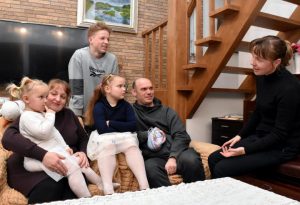Evacuee families in Hiroshima two years after Russia’s invasion of Ukraine, Part 3 — Decision to return to Ukraine even amid fears of war
Feb. 23, 2024
Thoughts of children’s education and mother far away
by Junichiro Hayashi and Kyoko Niiyama, Staff Writers
Dmitro Buvaylo, 39, and Irina Buvaylo, 38, a married couple who had fled Ukraine to Miyoshi City in Hiroshima Prefecture, remarked in unison about how they could not stay in Japan forever, considering their children’s education and futures. On the internet, the couple continues to search for a new home in a relatively safe area of Ukraine, setting their sights on a return back to their home country around mid-May.
The middle of May happens to mark the end of the school year in the local schools in Ukraine. The couple plans to have their oldest son, Olexandr, 14, go to the vocational school he hopes to attend. Their oldest daughter Zlata, 5, is about to enter elementary school. They also have a second daughter, Polina, 2.
At the beginning of April 2022, a little more than a month after Russian forces had invaded Ukraine, the family left their home in Donetsk Oblast in eastern Ukraine, where fierce fighting continues even now. They evacuated to Miyoshi City, counting on Oksana Yashchenko, 48, Irina’s cousin who is now a resident of the city.
Desire to help Ukraine reconstruction
The family of five currently lives in an apartment. Dmitro, a teacher, handles his lessons in Ukraine online and works at a supermarket, while Irina is employed at a welfare facility. The couple said they felt nothing but gratitude for the psychological and material support made available to them in Miyoshi.
The family will have to start from scratch upon their return to Ukraine. Mr. and Mrs. Buvaylo said they would be lying if they denied being afraid of attacks by Russian forces. Still, they emphasized their desire to contribute to the reconstruction of their country.
A substantial number of evacuees have decided to return to Ukraine even amid the continuing war. According to a survey conducted by a private research organization in Ukraine, 63 percent of evacuees had returned to Ukraine as of last summer. The largest number of respondents, 58 percent, indicated “homesickness” as the reason (multiple answers were allowed) for their return home. That was followed by 51 percent who selected “love of home,” 41 percent who indicated their “desire to reunite with family, relatives, and other loved ones,” and 20 percent who chose “sense of guilt about taking refuge.”
Yana Yanovska, 42, an evacuee who lives in Hiroshima City with her oldest daughter, 20, temporarily returned to Ukraine for the first time in November of last year. Wiping away tears, she explained how she had been worried about her mother, who remained behind in Ukraine.
Nerve-wracking days
On her return, Ms. Yanovska traveled for hours by car to arrive at her condominium in Kyiv (Kiev), Ukraine’s capital city, after first entering Latvia by way of Germany. What she found were buildings destroyed in bombing attacks and tanks lined up on the streets of the downtown. Air-raid sirens sounded multiple times each day. Prices had tripled and many of her friends had lost their jobs. She heard that a friend’s son and a friend of her oldest daughter had died following Russia’s invasion.
Ms. Yanovska spent the end of the year with her mother and her older sister’s family, who live in a town north of Kyiv, enjoying the food of her home country for the first time in a long while. Even as she had hoped to “stay put,” she felt unable to withstand day after nerve-wracking day of feeling her life was in danger.
After her stay of around two-and-a-half months in Ukraine, Ms. Yanovska returned to Hiroshima, where her oldest daughter awaited. In poor health, her aging mother declined to evacuate from the country despite her daughter’s urging. Ms. Yanovska said that she might not ever be able to see her mother again. A family photograph she took with her mother and the others during her temporary return to Ukraine now serves to bolster her spirits. She frequently looks at the photo.
(Originally published on February 23, 2024)








